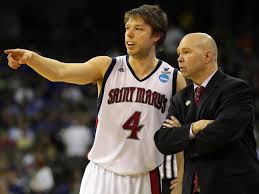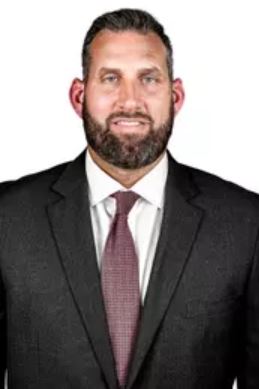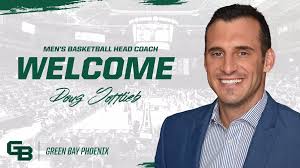The NBA Finals date back to 1947 (when they were known as the Basketball Association of America Finals) and the very 1st NCAA tourney was held in 1939. Olympic basketball competition is even older: it debuted as a demonstration event in 1904 and the men’s version became a medal sport in 1936, with the women finally getting their chance to go for the gold in 1976. The United States has dominated Olympic basketball competition from the start: the men have now won 17 gold medals in the 20 tournaments they have participated in during the past 88 years, while the women have won 10 gold medals in the 12 tournaments in which they have competed during the past 48 years. While we have to wait 4 years until the 2028 Olympics in Los Angeles, HoopsHD’s Jon Teitel will fill the void by interviewing as many prior Olympic players/coaches as possible. We continue our coverage by chatting with Fresno State play-by-play guys Paul Loeffler and Randy Rosenbloom about Paul George joining a new team last summer and winning a gold medal.



After Paul’s junior year of high school he verbally committed to Santa Clara (the 1st school that offered him a scholarship) but later decommitted because his high school coach thought he should keep his options open, then committed to Pepperdine but decommitted after Coach Vance Walberg (now the coach at Fresno State) resigned, and ultimately chose Fresno State because it was closer to home and he liked the campus: what was the reaction when he 1st arrived after this rollercoaster of a recruiting process? Paul Loeffler: Nobody really knew who he was. Steve Cleveland was the coach at the time and had a very good NIT team and a player named Dom McGuire who left early for the NBA. Paul was a skinny 6’7” FR who was all limbs. Early on you could see his skill: he had a laborious release on perimeter shots…but he made them. His coming-out moment was during 1 of those season-kickoff games that tipped off at 11 PM PT on national TV. In 1 halfcourt set against St. Mary’s he got into the paint and hammered home a dunk (www.youtube.com/watch?v=4uXmDwm8UJY): everyone in the gym had their jaws drop. He was injured as a sophomore (which cost him all-conference honors) but still finished the year strong. When he declared for the draft some people were unsure if he was ready but Pacers president Larry Bird saw something in him. Randy Rosenbloom: It is different for me because I got to see him play in a high school all-star game called “The Battle of the Valley” where he is from. That is where I 1st saw him and he was far and away the most talented player on the floor even though he was a little raw. After the game I had a nice chat with his mom/dad. I did not want to influence kids but I had heard that he was considering a few schools including Fresno State/Pepperdine. I told his parents that I felt he would fit in well with Pepperdine’s transition game and I was friends with their coach (Tom Asbury). I did not realize at that time that he would become an NBA superstar.
In 2009 he was 1 of the top-15 freshman scorers in the nation: how was he able to make such a smooth transition from high school to college? PL: He was 1 of those guys who believed in himself more than other people did. His parents moved to a small town 30 minutes outside of Fresno called Kingsburg, so they were able to attend all his games. Since there was not a lot of talent on the team that year he got a lot of playing time on the wing and was hitting 3s and was a much better defender than anyone realized. There was nothing he could not do and as he put on weight and gained more confidence he got better and better. RR: He was just more athletic than everyone around him. There was 1 game I remember against St. Mary’s that tipped off at midnight during an ESPN season-opening marathon game: Paul told me that he was yawning during the layup line! He made a dunk over Mickey McConnell that is still on YouTube.
In 2010 he set a school record with 90.9 FT%: what was his secret for making FTs? PL: Just dedication and work ethic: that is why he is 1 of the best players on the planet. He was not as good a FT shooter as a freshman but worked hard on his shooting. The old adages of muscle memory/repetition: he just became automatic that year. There was 1 home game vs. Boise State where he scored 29 PTS and became the leader of this team, which is a game that I think he would always remember. RR: 1 thing about Paul is that he had some holes in his game but he was trying to do a lot of different things. There was 1 game at Louisiana Tech where he had to play the point and helped them win down the stretch, which really impressed me. He had a streak of about 30 straight during that season that is still among the best in school history. I do not know if there is any secret to it: I think it was just a case of his hard work paying off. He missed a few games with a sprained ankle and I recall his 1st game back at Hawaii just lathering up before the game: I realized then and there that he was going to be great. He is a streaky player but when he goes off…he goes OFF! He scored 15 PTS in the 1st 4 minutes vs. Pepperdine and then did the exact same thing at Montana. Those 2 games showed his explosiveness, especially those 4-minute windows: we were looking at a Kobe/LeBron-type player.
In the spring of 2010 he was selected 10th overall by Indiana in the NBA draft: did he see that as a validation of his college career, or the realization of a lifelong dream of reaching the NBA, or other? PL: I think it was big-time validation because a lot of people questioned him when he decided to leave early…but he knew. He made a strong impression during his workouts and improved on everything: his foul-shooting, his 3-PT shooting, etc. He shored up every potential weakness in his game and scouts saw that he could guard anyone 1-5. My colleague Randy and I had a trip to Oregon State during his sophomore year and were trying to come up with a good nickname for him. He would often swoop right to the rim and Randy came up with the nickname “Swoop Dog”, which we used the rest of the year and which Paul liked. I still remember several of his dunks. RR: I do not think that it was unexpected by him. They got eliminated that March at the WAC tourney and I heard that he told the media that he was coming back the following year…but then he came on our postgame show and told us that he was jumping to the NBA. He had holes in his game and was inconsistent but certainly had his moments. He knew that he was explosive enough so I am not surprised that he went 10th overall. I knew a San Antonio scout named David Fehte who was hoping that he would drop to 16.
In 2019 he led the NBA in SPG and he is a 4-time member of the All-Defensive Team: what makes him such a great defender? PL: Clearly his length has something to do with that. He is coordinated and knows how to position himself to bait his opponent. He moves his feet well, can block shots, and is a student of the game. He has a humble confidence, which he got from his parents. He had the desire to outwork everyone, which you do not always see. RR: He is long, athletic, has a huge wingspan, and is very coachable. People say that Tom Brady did not mind getting yelled at, and I think Paul is the same way. His body made him a quick athlete and he worked hard on defense after people got in his ear.
In November of 2012 he broke Reggie Miller’s franchise record with 9 3PM in a win over New Orleans and he should pass Jason Terry next season to enter the top-10 of most career 3PM: how did he balance his great long-range shooting with his great defense? PL: If he sees a weakness in his game then that is what he pays attention to. His shot was a work in progress when he 1st arrived but it was consistent. Now he has a quick release and can get it off from any angle. He moves with great fluidity and everything he does is smooth both on and off the court. His range is limitless and he has the courage to take those shots. I do not think he gets enough credit for his mental game. RR: He had endurance working on his side so when he is in a game he can go for long stretches at a time. He is in great shape and always comes to camp in shape, which makes him a great 2-way player. Even in that high school game I recall him hitting 5 threes in the 2nd half. He has great confidence in his shot and can get to his spot, and if you get in his face then he can drive right around you.
He played for Team USA at the 2016 Olympics: what did it mean to him to represent his country, and what did it mean to him to win a gold medal? PL: I know it meant the world to him and his family. It is never about him but rather who he represents. The injury in 2014 was catastrophic/devastating but it steeled his resolve and he came back even stronger. I do not know exactly how to rank the players today but I think he is 1 of the top-5 players on the planet in terms of his all-around game. RR: He is an emotional guy so I think that it had to mean everything for him. Imagine a guy making it to the Olympics after not being recruited heavily by USC/UCLA, playing for the Clippers rather than the Lakers, then having that horrible injury in Vegas.
In 2019 his #24 was retired by Fresno State: where does he rank among the greatest players in school history? PL: His playing career at Fresno State was good but not great. Other players had better stats or more team success but nobody has come close to what he has done in the NBA in terms of stats/awards. When he came back for the retirement ceremony the entire Clippers organization also came here for it, from his teammates to his coach Doc Rivers to his owner Steve Ballmer. RR: It depends on how you look at it. If you are talking about the most accomplished NBA player he is #1, but in terms of his college career he was not even 1st-team all-conference, although he had great moments. He was like Sandy Koufax/Gale Sayers: a streaking guy who went through the program in just 2 years.
Last July he signed as a free agent with the 76ers: how do you think that he is going to do in Philly? PL: I think he will mesh with them perfectly because it is never about him. During his time here his mother was battling some specific health challenges, so he has never taken anything for granted. That is why he was willing to play the post in high school: he always put his team/family 1st. He knows the 76ers have plenty of other firepower so if they need him to give it up to Joel Embiid he will: he is the ideal team guy, which has had a huge role in his success. He gave his cell # to everyone on the Fresno roster last year and told them to call him if he needed anything: the quality of human being that he is has not changed a bit. RR: He fits in: he has the man in the middle in Embiid and has Tyrese Maxey at the point so he will get a lot of opportunities to make threes. He will have to perform otherwise the crowd will get on his case in Philly but he should get really good looks and have success.
He is a 9-time All-Star: do you think that we will see him inducted into the Hall of Fame some day? PL: I do not think there is any doubt because he is not done so his numbers will only get better. No matter how you slice it his consistency over time, on top of overcoming an injury that would have ended many players’ careers, is amazing. He has made the game better and is an ambassador for every team he has played on because that is the kind of guy he is. He is not looking for the spotlight but it will find him because of the good he does. RR: He is 1 of my favorite guys but the main knock is that his team has never won a title. He is closing in on 20,000 PTS with 20 PPG, which is very hard to do, and when you add in the STL/defense then it will be hard to deny him. I think it is a better than 50-50 shot. I am rooting for him internally since I have known him for so long and because he is just a friendly guy.






